
Home |
Up |
Next |
Prev |
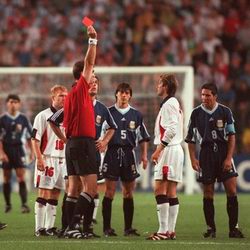
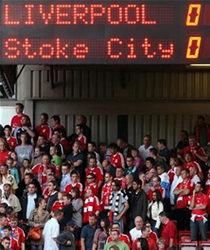

Problems with the World Game? - 3 billion fans can't be wrong... can they?
What's wrong with soccer?
Soccer, or as it is known in most countries: "Football", is easily the most popular game in the world, and the most watched item on TV screens across the globe. If it's so popular surely there can't be anything wrong with it... can there?
Well yes, in my opinion quite a lot in fact. In countries such as Australia, USA and New Zealand where other outdoor team ball games are dominant, soccer struggles to make any inroads, despite its global profile, due to its various flaws. If soccer were the perfect outdoor team game its rise in these nations would be irresistible.
"Ok", you say, "If soccer is so imperfect, why is it so popular world-wide?" The reason for that is that outdoor male team sports are the modern substitute for warfare. Tribal allegiance is in our blood, and particularly in males, the desire is embedded deep within us to participate in the defence of our tribal territory. If we can't participate in the ritualised combat substitute we can at least watch it. Hence the universal desire of males to follow one particular team, (usually their home team). A study of countries where different forms of football exist shows that it doesn't matter which form of tribal combat substitute is employed, they all fulfil the same need and they all produce much the same social effect. The dominant code is usually simply that which rose first. Soccer is the simplest of the two English codes, (Rugger being the other), and was thus the one picked up by most of the world. Variations on the rugby scheme proved more popular in countries where the men preferred something closer to real violence.
"Oh yeah", you say, "So why didn't all these countries have their own codes of football long before the English made their presence felt?" Well, of course, to some extent they did. The real difference came with the invention of the leather clad, inflatable ball that was geometrically perfect, durable, and a joy to kick! This new ball could be sent where the kicker desired and controlled like nothing before it. Sure, you could have fun with an animal skin stuffed with ashes, an irregularly shaped pig's bladder or the head of a dead enemy, but that fun was rather limited, this new toy was something else entirely! The new ball was only invented in the early 1800s and the English were simply the first to come up with these 2 new games. The spherical ball was the simplest to make, the most intuitive to kick, the least fun to hold in the hands, the most awkward to throw and soccer was born!
So there it is: Soccer is not more popular because it is intrinsically better than other football codes, simply because it was in the right place at the right time and it is simpler than its main rival. Having thus dispelled the notion that soccer is the one true game descended from God himself and that 3 billion people can't be wrong, we can now launch into the problems with the game and what can be done to improve it.
There are not enough goals scored
This is the number one bone of contention in the soccer world. First of all, many soccer fans will challenge the veracity of this assertion, they will tell you that 1-1 draws are fine, 0-0 draws can be ok and a 1-0 win is best of all. Well, that might be what they say, but if you push a bit harder you will find out that nobody really enjoys a 0-0 draw except those who are looking to progress on points, and fans absolutely hate losing 0-1 when they feel they were the better team on the day.
The fact is that goals are like orgasms: If you don't score you go home unfulfilled. This doesn't mean that more goals is always better, consider basketball where there are so many that they lose individual meaning, but too few is even more unsatisfactory. As an avowed Australian Rules follower I consider somewhere between 10 and 20 goals over 100 minutes from the better side to be appropriately satisfying.
When there are only 1 or 2 goals in a game, not only is it unsatisfying, but it may also be unjust. There is always the opportunity for a freak occurrence, a lucky shot, or an umpiring error to result in a goal against the flow of play. Similarly there is always the opportunity for a freak occurrence, a lucky save, or an umpiring error to prevent a deserved goal. In a low scoring match such events may well decide the match, resulting in an unjust result where the better team on the day does not win. In higher scoring games the occurrence of unjust results is greatly reduced. For example: in the entire AFL fixture you would be unlikely to see an unjust result more that once in a year.
I'm not trying to suggest that soccer teams should exhibit regular 20 goal hauls, but in order to address the above shortcomings the winning side should normally be scoring at least 5 goals. Believe me, you will find this so much more satisfying.
So what can be done about it?
There are various reasons for the paucity of goals: the size of the net, the presence of a goal keeper, the defensive nature of the game (in particular the off-side rule) and the defender's use of the professional foul. Altering any of these parameters would increase the number of goals.
- Increasing the size of the net is a sloppy solution as it would reward inaccurate striking.
- Removing the keeper altogether is my preferred option here as I find his existence in the first place quite bizarre. Why should there be one man on each team who is allowed to hold the ball when it is forbidden for the rest? He exists purely to reduce the number of goals, he is an anomaly and he should go. With no keeper to beat, goals will be far easier to score and this will also make the game more attacking and a better spectacle.
- Removing the off-side rule will increase the prevalence of goals but I shall deal with it further on.
- The use of the professional foul is something that the game's governors have tried to stamp out, (along with its conjugate: the penalty box dive), but the fact is, it's too tricky to detect and the game's best defenders are so good at it that it can't really be stopped by umpiring.
There are too many stoppages
This might not appear to worry most fans, but for outsiders who simply wish to watch an engaging spectacle this is a real problem. You are lucky to see a passage of play lasting more than 30 seconds before a foul stops play or the ball goes over a line. I know that gridiron is worse and rugby league is much the same, but football is supposed to be about excitement, and stopping play stops the excitement. The end result of constant stoppages are games like golf and cricket which are ok in their own way but you don't go to a cricket test to be excited.
The perfect game is one where there is NO stoppage of play at all! Unfortunately, on a field with sidelines, where players may contact each other, such a thing is impossible. Still, it behoves the game's custodians to attempt it.
The remedies for this problem are simple though drastic: You could reduce the number of fouls called, reduce the number of out-of-bounds, reduce the number of off-sides called and reduce the number of goalie stoppages.
- Fouls are the greatest blight on the game. The simplest solution would be to remove them but then the game would become a blood bath... Ah well.
- Out of bounds could be reduced by the use of a low wall around the pitch, say waist high, so that the ball will stay in unless it is high. Of course a low wall might be a tad dangerous for the players but it works fine in indoor soccer...
- Offside calls can be eliminated by the removal of the offside rule, see later.
- The sight of goalies grabbing the ball defusing the attack and slowing down the play can be eliminated altogether by the removal of the anachronism from the scene, namely: the goalie!
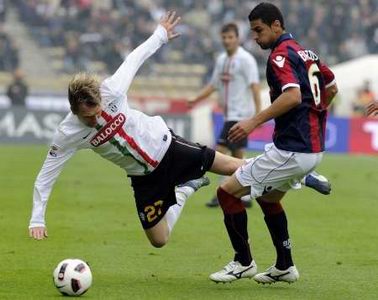
Milos Krasic with a penalty box dive in Italy's Serie A.
The referees have too much power to influence the result
Anyone who has watched any high level soccer will have observed a number of dubious referee calls resulting in: goals scored that shouldn't have been, goals not scored that should have been, players sent off that should have stayed on and players staying on that should have been sent off. Quite often these bad decisions result in an unjust result.
The fact is that referees are only human and a) they can't always be in the best position to see what happened, b) they can't always maintain judgemental balance, c) when there is a great deal riding on their call they get nervous and can't always make the decision they otherwise would, d) they may have taken a bribe, and e) they may feel their governing body want a particular outcome...
Whether they are deliberately making bad calls or whether such calls are accidental the fact remains that there is too much opportunity for a bad call to alter the result of a match.
What can be done about it?
Options include: removing the umpires, increasing the number of umpires and what I think is the best solution: diluting the referee's power. This can be accomplished by various measures such as: revoking the send off rule, increasing the number of goals, revoking the ability to award penalties.
- Removing the umpires isn't quite as stupid as it sounds, in the beginning soccer matches were umpired by the captains and fair play was expected. Obviously we are all much more cynical and venal now but still...
- Increasing the number of umpires helps the situation where the ref is unsighted or too far from the play to make the proper call, but Aussie Rules experience shows that it results if a lot of nit-picking calls that simply slow the play down.
- Revoking the send off rule is generally a positive matter which I will deal with later. The point here is that the course of a game won't be altered by an incorrect or marginal send-off.
- Increasing the number of goals scored is a win in many ways. For the benefit of the section it means that one wrong goal probably won't alter the result.
- How many times have we seen a dive rewarded by the ref pointing to the penalty spot? Ditto a fair tackle against some untouchable "golden boy". This is a major blight on the game. Simply remove that sanction from the referees box of tricks! Yes this might make the game rougher and goals harder to score, but if you get one you'll know that you've deserved it!
The game is too defensive
Soccer as a game is SUPER defensive: Common score lines of 1-1, 0-1 and 0-0 demonstrate this beyond any shadow of doubt, in fact, if it were any more defensive nobody would score at all! Die hard soccer fans will tell you that this defensiveness makes the game more exciting as it means each goal is worth so much more, furthermore, no matter how outclassed your team is, provided you're only 0-1 down there's always a chance you'll get back into it.
Yeah well that might be ok for the die hard fan, but for the rest of us, low scoring games are just plain BORING! What is the point of breathtaking skill, discipline and aggression, if time and time again the best attacking moves fail, simply because the system is rigged against them? I've watched low and high scoring games, and for me personally, although there is such a thing as too many goals, I like to see a fine attacking move rewarded on the scoreboard. As I mentioned earlier, a winning side scoring 10 to 20 times feels appropriately satisfying.
The extreme defensive nature of the game means that boring sides without flair can do well, even at the highest level, by sitting back, defending strongly and then hitting with a single fast striker on the counter attack, while the opposition are out of position. Either that or wait for a penalty shoot out to steal a victory that they do not deserve. Conversely, a talented attacking side that takes risks and is fun to watch will often be defeated by the above cynical defensive team, a situation that pleases no one except the winners and discourages creativity at all levels of the game.
A defensive game is not only a boring game it is a LAZY game. Teams feel comfortable in defence because the odds are in their favour, so they are happy to just roll the ball around and stay deep, knowing they won't be hurt. But this is BAD from the point of view of spectators, who wish to see an absorbing contest. If the odds were instead with the ATTACKING team, then instantly, no one would want to be on the defensive and the fight would REALLY be on! Now THAT is what we want to see!
Several factors intrinsic to the current rule structure facilitate this defensiveness, primarily: the offside rule and the presence of the goal keeper.
- Removing the off-side rule would make the game more attacking and I shall have more to say on it later.
- Removing the keeper would increase the number of goals scored and would make a side far more nervous in defence, knowing they have no back stop. This would REALLY shake up the game!
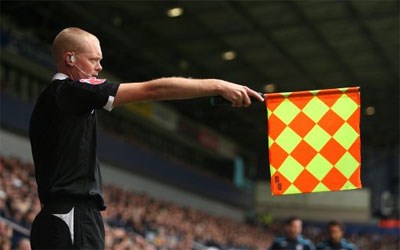
The dreaded offside flag is raised...
Offside is a bad rule
Go ahead, stand up and yell that: "Offside is the soul of football!" Go ahead, I dare you. I'll admit that it might be the second or third most influential rule in the game, but that doesn't mean it's a GOOD influence. It is NOT essential to the game, but was brought in in 1848 by a bunch of dour Victorian prudes who wanted to make it harder to score. They certainly succeeded in that objective, and employed more umpires and caused a great deal of argument and bad feeling from that day forth into the bargain!
The idea that teams should face each other in lines and that you can't penetrate the opponents line without the ball is a MILITARY concept. This idea is all very well if that's what you want to see, but rugby is so much more the embodiment of this notion that it should be left to rugby alone. Soccer at it's heart is about kicking the ball, dribbling, running, heading, tackling, passing, strategy and tactics. It's about free expression, talent and fun! At its heart it is an ATTACKING game. Leave the military out of it.
Inveterate soccer fans are horrified by the idea that a striker could be standing right on the goal line while the ball is up the field and coming down to him. "You can't do that!" they say... Well I'm sorry if you don't like it, but YES YOU CAN! This kind of thing takes place all the time in Australian Rules and it does NOT ruin the game. Far from it! It keeps the defence on their toes and adds to the goals scored, both of which make for a more compelling spectacle. When the ball gets within range of the full forward and he is within range of goal, he starts to lick his lips, his marker gets damn nervous, and that, believe it or not, is good to watch!
Even if you think offside is a good rule, you have to admit that it's extremely hard to officiate. There's just no way humans are always going to get those decisions right and they will always tend to err on the side of the defence, once again adding to the stifling nature of the game. How many times have you seen a worthy run and shot on goal stifled due to an incorrect or marginal offside call?
Removing the offside rule will not be the end of the game as you know it folks. Sure there will be one or two attackers more or less permanently on the defence's goal line, but so what? They still have to beat their markers, and the defence further up the field will still block their supply. Goals will not suddenly be given to them, they will have to earn them, and they will require the same skill, speed and aggressive instinct that they need in the current regime. Goals will be easier but they still won't be EASY!
Offside is an anachronism from a bygone age. It runs counter to the modern ideal of the beautiful game. There is no reason to keep it. Revoke it!
The red card is too great a penalty
A defender makes a desperate challenge on a striker who has entered the box. The challenge is perceived as crude and the defender is immediately shown a red card. Is this just? What was the defender supposed to do? Stand by and watch the striker take a free shot? It is the defender's JOB to attempt to stop such runs. It is not meet to send him off for doing his JOB! Not only is he sent off but his side is short one player FOR THE REST OF THE GAME! Not only that, but the opposition get a penalty shot AS WELL!?
Clearly this is a grossly disproportionate sanction. What bunch of IDIOTS thought this was a good idea? Ummm, ahhh, ummm, could it have been FIFA? Sepp Blatter and his corrupt and brainless cronies?
One bad decision and one disproportionate sanction and the game is wrecked as a spectacle. A bit stiff when it's still the first half! So why did they bring this in? Well strikers were being unfairly hewn down from behind and stern action was needed to stop it... Oh yeah? But how much was real pain and how much was a bunch of diving and acting from a massive cast of European and Latin American sooky punces. I would have thought that a penalty shot would have been sanction enough for the offence. Let him stand up and take it or else it's a goal kick. That'll get the ponce back on his feet!
I understand that soccer is more or less a non-contact sport but that doesn't mean it has to be a game for ponces. A man should be expected to be able to take a few knocks and get straight back up. If you're still on the ground a minute later and not injured, then you're a baby and should be booed from the ground.
The only justification that I can think of for sending a player off is a violent attack on another player outside the spirit of the game and designed to occasion real injury. Even then, I think he should be allowed to be replaced with a substitute.
The power to send a player off the ground for the duration of the match is a sanction not available to umpires in Australian Rules, yet the game is not a blood bath as a consequence. Players are careful to avoid unduly rough play since they know that they will be caught on video and suspended by the tribunal who will review the evidence during the following week. TRIAL BY VIDEO is the correct way to stamp out on field violence, not the issuing of red cards in the heat of the moment.
The idea that 2 yellow cards equal a red card and thus you can be sent off for two minor offences in two separate games is INSANE! How is a player expected to play properly with such a sanction hanging over his head?
A player talks back to the ref and he's sent off? MADNESS! This kind of high stakes punishment hinging on people's egos and frail judgement is asking for trouble, and how often do we see entire sides getting involved, tempers fraying and all manner of cards being handed out, ruining the game in the process.
Look folks, the PUNISHMENT MUST FIT THE CRIME and the red card doesn't fit any crime you are likely to see on the pitch. Sanctions like free kicks and penalties are all you need. Leave the players on the field!
The teams are uneven
Have a look at the English Premier League, who's in running for the silverware this year? No surprise, it's the same old faces! And the same is true in every country around the world. The English pride themselves on their FA cup and the egalitarian notion that EVERY team in the land has the chance to win it... Well no they don't. Not really. Teams can progress further than expected, but in reality only the top clubs can ACTUALLY win it and that is because they have the best players, the best coaches and the best support.
The top clubs have all this because they have the most MONEY! If another club has better players they can simply BUY those players, and VOILA! they win again! You can talk about players rights and restraint of trade, but the fact is: free agency wrecks the game for all except the rich.
Yes, it's fine if you're a Manchester United or AC Milan fan, but what if you grew up in Scunthorpe or Arezzo? Unless you are completely stupid you realise at an early age that your team will NEVER win anything major. So what do you do? Give up on football and take up online gaming, or join one of the behemoths like Chelsea or Roma, and pretend that they're your team, just so you can play in the big league.
Even if you happen to grow up in a city that plays in the big league but is on the fringes, like Middlesbrough or Bari, you are still unlikely to ever win the big one, because even within the top 20 the gap in wealth is still vast.
It's heartbreaking too, for the marginal teams, for when they discover a champion within their ranks he is quickly poached by their wealthy rivals and they are left with nothing once more. It's no use talking about team spirit and overcoming the odds because the fact is that money is the great persuader.
But there IS a solution to this problem. It's called THE DRAFT!
The Draft is a system used in the USA and Australia whereby players set aside free agency in order to play in the competition. Each club is allocated an equal salary cap and thus the rich clubs cannot use their greater wealth to buy all the good players. Furthermore, clubs are allocated first picks on a reverse ladder order, so that the worst clubs get the first pick of the best players, which acts to equalise the cream of the talent. Nor can a player refuse to go to the club that selects him. If they meet his price he is SOLD!
You might think this is unfair and restrictive, but the fact is that is WORKS! In the Australian Football League, the last couple of decades have seen perennial cellar dwellers climb off the bottom of the ladder and force their way into the top bracket, in some cases even winning the premiership! Conversely, some rich clubs who thought they were born to rule have found themselves at the bottom of the ladder, asking themselves some rather stern questions.
Yes it's tough on the rich sides who can't simply buy their way out of a slump, but it's GREAT for those battling clubs who can finally match it with the big boys. For supporters of those marginal clubs it's an absolute godsend.
As for the players: you might think they'd be bitter about being sent to a struggling club, but the fact is that most of the time they seem to fit in very well and soon acquire a strong allegiance to their new home.

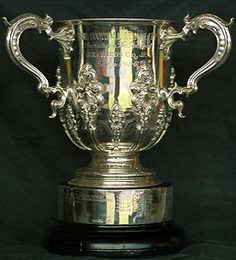
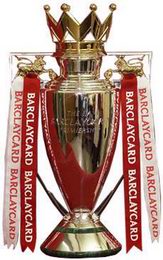


Too many cups! I'd say you could safely get rid of at least 2 of these.
There are too many cups
Consider the English Premier League, there is:
- the FA Cup: a knockout comp for all clubs in the land.
- the Premiership: a long round robin comp for the best 20 clubs.
- the Football League Cup: a knockout comp for the main clubs in the land.
but that's not all, then there is also:
- the UEFA Champions League: a mixture of round robin and knockout for the best 32 clubs in Europe.
- the UEFA Europa League: a bizarre mix of round robins and knockouts for teams that fit UEFA's crazy qualification scheme. Nuts!
So your club happens to win the FA cup one year but a rival club takes out the Premiership. So who's the better team? Who gets the bragging rights? You beat them in the FA cup final, but they won more games in the Premiership. To make matters worse, another rival then takes out the prestigious UEFA Champions League. So are they then better?
Sure, it's nice to win some silverware, and the more cups there are the greater the chance of your team taking one home, but remember the words of William Schwenk Gilbert: "When everybody's somebody, then no one's anybody!"
In the Australian Football League these days there is ONLY ONE TROPHY! That's right, just one. Sure, it's tough to win, but if you do, then you are the undisputed Kings. (at least until next year...)
The situation is made worse by the presence of regional international cups such as the Copa América in addition to the World Cup itself. I know people want to participate in these things, but it seems that the roundabout NEVER stops! Where is the time where you can just chill out and do some gardening? At least in Australia, when the season's over we don't hear from it again for a full 6 months! Surely there is such a thing as "too much of a good thing"?
Conclusion
Soccer is easily the most popular spectator sport in the world, but that is more down to good luck than any intrinsic superiority over other football codes. Despite it's dominance across the globe there is a great deal wrong with the game and if it is to justify its preeminent status and win over the adherents of other codes it needs to address these shortcomings.
The great problems with the current state of the game are 1) a paucity of goals, 2) too many stoppages, 3) referees have too much power, 4) the game is too defensive, 5) the competitions are unbalanced.
The solutions to these problems are: 1) get rid of the goal keeper, 2) revoke the offside rule, 3) remove the red card sanction, 4) introduce a draft.
Thank you for reading. If you wish to respond why not join my forums and have your own say.
Warren Mars - December 2010